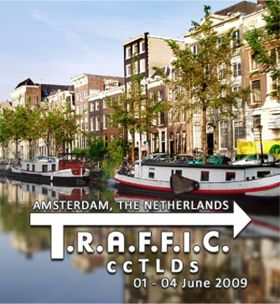|
With all of these firsts in front of me I began
the trip to the Netherlands with only a rough idea of what
was waiting for me on the other side of the Atlantic. When I was on my way back home a week later I was sure
of one thing though - the Latona team had topped anything I could
have imagined for an organization taking their first lap around the
show promotion track.
If you follow this industry, you've undoubtedly
already heard the positive buzz from the 200 or so people who
attended this event. Their high level of satisfaction again proved
the old adage that a sure fire path to success is to exceed
your customer's expectations.
|
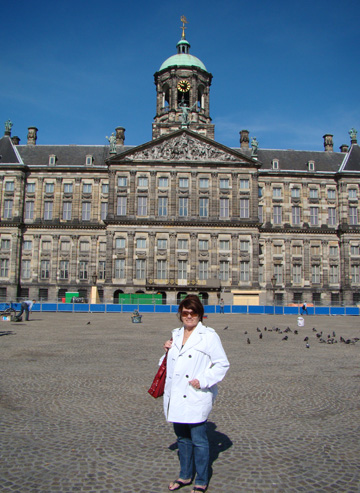
Amsterdam's
Royal Palace,
directly across Dam
Square from the NH Grand Hotel Krasnapolsky
where the T.R.A.F.F.I.C. ccTLDs show was staged. |
For first time visitors to Amsterdam, as my
wife Diana and I were, the pleasant surprises began as soon as we
arrived at the conference venue - the popular NH Grand Hotel
Krasnapolsky - located in the most central location you
could possibly imagine in this historic and charming city on the North
Sea. The hotel sits on Dam Square, the heart of Amsterdam
where you will also find the stately Royal Palace that was
built in the 1600's to be Europe's grandest Town Hall (it didn't
become known as the Royal Palace until King Louis I (Napoleon
Bonaparte's brother) took up residence there in the early
1800s).
We arrived on Sunday morning (May 31) so we
could have a couple of days to explore the city before the
conference began with a welcoming cocktail party/dinner on Monday
night. The first thing we did was hop on one of the boats that take
you on a tour through Amsterdam's scenic canal system. With more
than 100 kilometers of waterways within the city, you can go just
about anywhere by boat. The city also has a completely different
look from the canals than it does from street level - one much more
tranquil than the hustle and bustle at street level a few feet
above.
|
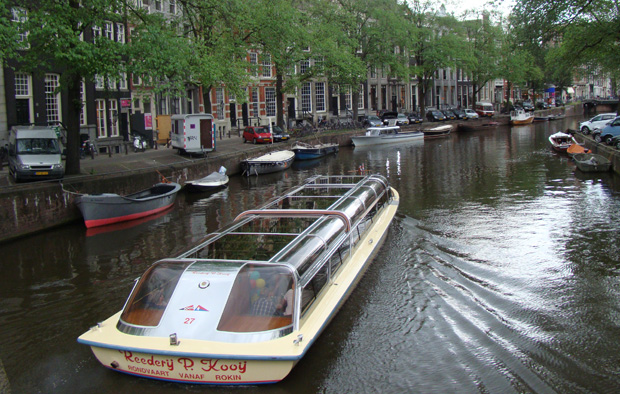
One
of the boats that took us on a tour of Amsterdam's scenic canals.
| Having flown all night to get to Holland, after
the canal tour we headed back to the hotel to catch an early
afternoon nap, then hooked up with the Neu family, Howard,
Barbara and Ray, for dinner at a nearby Argentinean
steak house (The Neus worked nearly around the clock with the Latona
team to make sure this show would be something special). Amsterdam has more restaurants than any city I have
ever visited. There seems to be one in every other
storefront and every kind of food you can imagine is within walking
distance.
We spent the day Monday walking down the
busiest shopping street - Kalverstraat - and through the
historic and diverse neighborhoods that date back centuries. As
evening approached we headed back to the hotel where the curtain on
T.R.A.F.F.I.C. ccTLDs went up at 7:30pm with a cocktail reception
and lavish buffet dinner that gave attendees their first chance to
start making new friends from around the world. Getting to meet so
many domainers from other countries for the first time was the
highlight of the trip for me. |
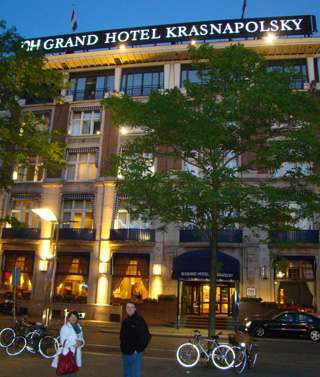
The
NH Grand Hotel Krasnapolsky
The venue for T.R.A.F.F.I.C. ccTLDs |
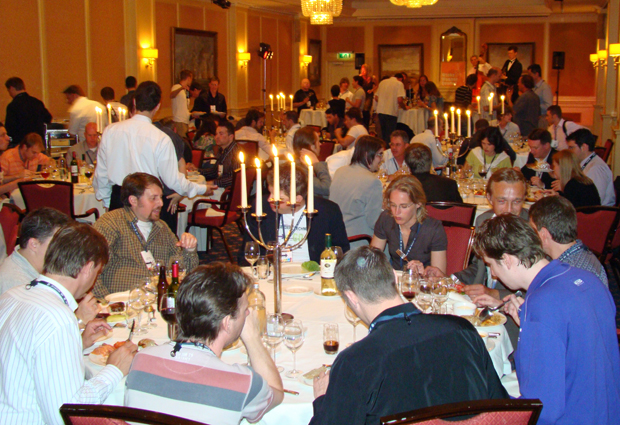
Attendees
get acquainted at the opening night dinner (Monday, June 1)
Everything about this show was fresh - fresh
faces, fresh venue and fresh content. As closely as I have followed
this industry for the past seven years there was still a lot about
ccTLDs that I didn't know, so like everyone else I got a valuable
education in Amsterdam and came back with a much greater
appreciation for the mind share country codes have among Internet
users outside the U.S. (a group that, incidentally, is growing much
faster than the user base in the mature American market).
In walking
around Amsterdam I saw the Dutch .nl domain everywhere - it
was much more prevalent that .com. I couldn't help but think how
quickly America's overlooked .us extension would go
from zero to 60 if it could generate just a fraction of the
visibility that European extensions have in their respective
countries.
The next morning, we heard from leaders of four
of those popular European ccTLDs in the show's opening seminar.
Representatives from the .nl (Netherlands), .de (Germany),
.co.uk (Great Britain) and .at (Austria) registries
provided the latest news on their ccTLDs, background on ownership
restrictions, costs and other important details for those interested
in investing in their extensions.
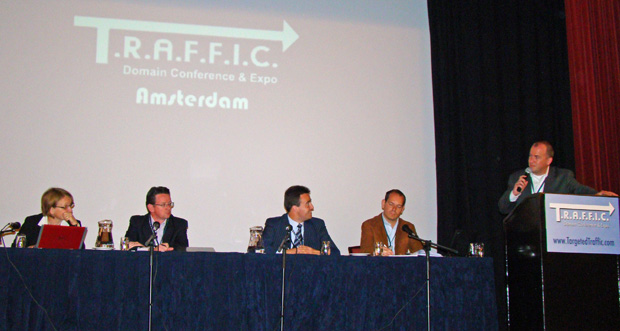
Opening
panel discussion featuring (L to R) Sabine Dolderer (CEO,
DENIC),
Phil Kingsland
(Nominet), Michiel Henneke (SIDN), Klemens Pidner (NIC.at)
and moderator Michael Ward.
The four panelists represented a total of 23
million registered ccTLD - a whopping 32% of the global
country code market. Phil Kingsland of .co.uk administrator Nominet
said the extension is experiencing some of the biggest growth it has
seen since the .com boom of a decade ago. Kingsland added that 150,000
new .co.uk domains are registered every month and that a survey
showed that 80% of businesses in the UK prefer the .co.uk
extension over the .com.
In an interesting tidbit about Germany's wildly
popular .de extension, DENIC's CEO Sabine Dolderer said 50%
of all .de domains have hyphens in them! Michiel Henneke of
the .nl registry SIDN said that Sedo told him the
average sale price of .nl domains on their platform soared from 1,500
euros in 2007 to 2,890 euros in 2008. Klemens Pidner
of NIC.at said that in a recent 90-minute drive across Austria
he snapped photos of 186 domain names he saw on signs along the way.
72% of those were .at domains, 16% were .coms
and 6% represented neighboring Germany's .de.
All four panelists said their ccTLDs were still
growing despite the global recession. All four also agreed that they saw
little usage of the regional .eu (European Union)
extension in their countries. Regarding the new gTLDs that ICANN
plans to start rolling out next year, the panelists universally felt
that they would have a very hard time getting off the ground. They
noted that success requires usage and the existing
extensions are too strong to be dislodged now because people already
know and trust them.
|
During the opening day luncheon (sponsored by Rick
Latona Auctions in support of the ICA) Internet
Commerce Association President Jeremiah Johnston
spoke about current threats to ccTLD investors, most notably a
recent move by Argentina's .ar registry to bar anyone from
owning more than 200 domains. Those who already own more will
not be allowed to renew more than 200 so the onerous restriction
retroactively applies to people who purchased their domains in good
faith under the rules that existed at the time. If this kind of
policy spreads to other registries it would obviously be disastrous
for domain owners around the world.
As I have noted before, the ICA is the only
credible organization in the world that employs a full time legal
counsel (Phil Corwin) to fight on behalf of domain owners
before U.S. government officials, the courts and ICANN. The
organization needs membership support from the global domain
community to keep going. At this time less than a handful of major
donors have kept the ICA alive but those few companies and
individuals cannot continue to pay the freight for everyone else
much longer. The group has
|
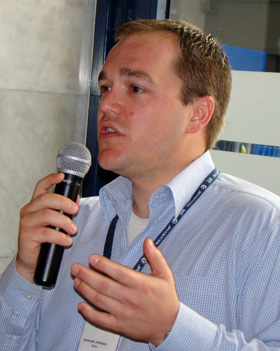
ICA
President Jeremiah Johnston
speaking at the Tuesday luncheon. |
| already had to eliminate one of only two
paid positions that it had (Executive Director) due to lack of
funds. Aside from Corwin, everyone else in the organization
(including myself as a member of the board of directors) is an
unpaid volunteer. |
We do it because the alternative is to do
nothing and watch domain owner rights and assets disappear
through legal and policy changes. My biggest disappointment in this
industry is that the vast majority is doing nothing to help
protect their livelihoods. As a community, we are lambs who will be
led to slaughter if we don't wake up and join forces together to
defend ourselves from predators who want to take away what we have.
|
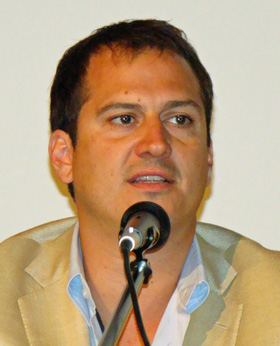
Rick
Latona |
In an especially interesting seminar after
lunch, five large portfolio owners discussed their experiences in
the domain business and the routes they each took to find success.
Show organizer Rick Latona was on that panel and he drew a big round
of applause from the audience when he was introduced. Latona has
become the most visible individual advocate for ccTLDs in the world
since he started investing in country code domains just a year and a
half ago.
Latona was primarily a .com guy but as a world
traveler he couldn't help but notice ccTLDs ruled just about
everywhere outside the U.S. So he dove into the country code market
head first and has now accumulated 30,000 of them. He started a
special forum at ccTLDs.com to help spread the country code gospel
and to cap it off he took the huge gamble of underwriting a major
conference devoted entirely to ccTLDs. It was obvious the
audience appreciated that the work and money he is pouring into
promoting ccTLDs is building the value of all of their portfolios.
|

Panel
of large ccTLD portfolio owners (left to right): Rick Latona,
Hennie Groot Lipman,
Nico Zeifang, Alexander Schubert and Edwin Haward.
|
Major .co.uk investor Edwin Hayward said
that his sales inquiries jumped dramatically when he decided to stop
parking his domains almost four years ago. He noted that over the
past four years he has sold over 540 domains. He sold 111 total in
2006-2007 while they were parked. In the less than two years since
he stopped parking them in early 2008 he has sold 431 domains,
easily offsetting what he gave up on parking revenues. Rather than
a parking company landing page he said each of his domains leads to
a customized home page dedicated to marketing the domain to end
users.
In Tuesday's final panel session,
representatives from three rapidly growing registries, India's
.in, Poland's .pl and Mexico's .mx, provided a wealth of
information on those extensions.
|

Edwin
Hayward |
|
|
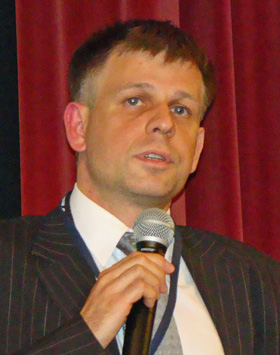
Dr. Andrzej Bartosiewicz
NASK.pl (the .pl registry) |
Dr. Andrzej Bartosiewicz of Poland's .pl
registry, NASK.pl, was a real breath of fresh air.
Unlike many other registry officials he openly embraced the
professional domain investment community and the registry has
established many investor friendly policies. The extension is open
to anyone anywhere and the fee for new registrations is just 2.20
euros. The registry publishes free drop lists for domainers three
times a day and 85% of dropped domains are snapped back up with 24
hours. .pl even has a Wait List Service that gives WLS holders a guarantee
that they will get a domain if it drops within 3 years.
Their domainer friendly policies have helped
.pl explode in growth (70% year over year) and
recently pass 1.4 million total registrations. .pl is now the
6th biggest domain in the European Union and it expects to pass France's
.fr this year. You can get much more information on .pl here - DNS.pl/essentials.
Jeffrey Behrendt, who operates a popular
ccTLD forum at Inforum.in,
made the case for India's .in extension. Behrendt pointed out
|
| that English is the primary business language in India making it
easier for English speakers to pick relevant .in domains. He added
that there are still many good domains available for hand
registration in the extension. You certainly can't ignore India's
1.15 billion population, representing one of every five people
on earth! |
Oscar Robles-Garay represented Mexico's
rapidly expanding .mx registry that has averaged 27%
annual growth over the past five years. In the past you could only
register second level .mx domains (i.e. .com.mx) but they
have just opened up the first level .mx and it is in sunrise
right now. With that move Robles expects Mexico's already fast
growth to accelerate. .mx happens to be one of the extensions that
Rick Latona has been investing heavily in.
The next order of business was a new version of
T.R.A.F.F.I.C.'s always popular speed networking session. An
inner circle of
chairs was placed around the sofas where people were able to lounge
in the sponsor exhibit area during the day. An outer ring of chairs
was placed around the first circle so attendees were facing each
other around the hall. Every couple of minutes those on the outside
circle moved one place to their right so that each person was able
to meet dozens of new people during the 90-minute session.
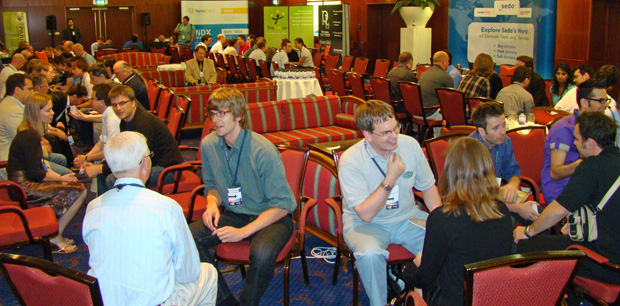
Scene
from the Speed Networking session Tuesday (June 2)
The
Tuesday night dinner would be another one of those unique events
that set this show apart from its predecessors. Tour guides led
groups of attendees on a comfortable walk across Amsterdam to the
historic West Indies House (where the original plans for the
city of New York were drawn up in the 1600's). The evening
started with a cocktail hour in the courtyard and culminated with an
Indonesian buffet dinner served both indoors and out. Throughout the
evening guests were welcome to walk through the house where so much
history was made nearly 400 years ago.
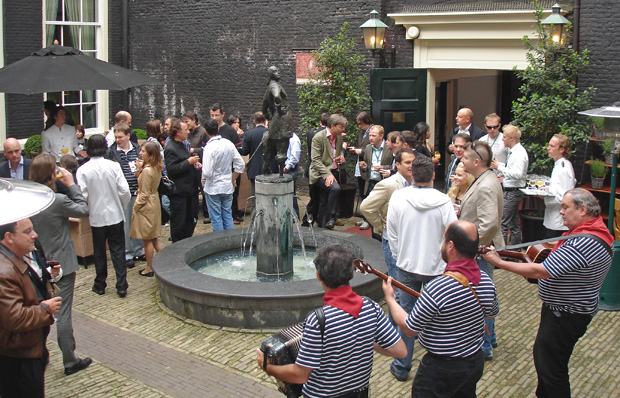
Above:
Cocktail hour in the courtyard at the historic West Indies House
Below: Inside the House, (left to right): Beth & Gregg McNair,
Ammar Kubba & Omar Kubba
(these two photos courtesy of Barbara Neu)
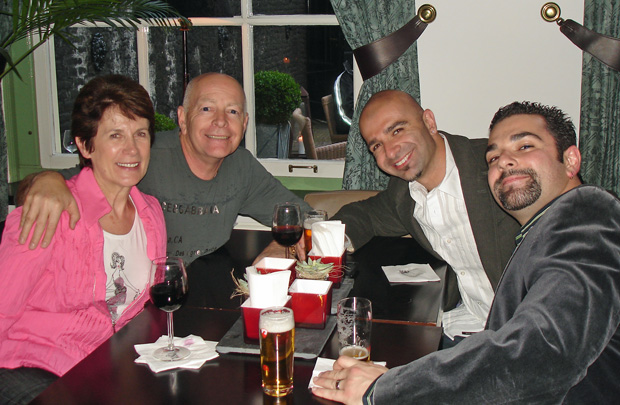
Wednesday
(June 3) opened, as each day of the conference did, with a sumptuous
breakfast buffet in the hotel's stunning Winter Garden.
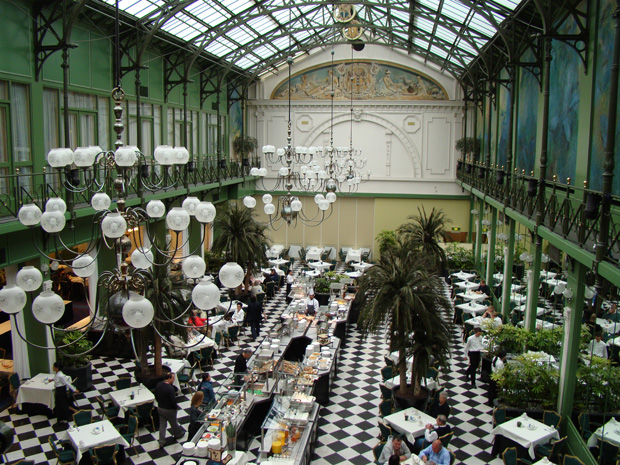
The
fabulous Winter Garden Restaurant at the NH Grand
Hotel Krasnapolsky
After
fueling up for the day ahead, it was on to the opening seminar
featuring representatives from America's .us registry and Cameroon's
.cm. The Latona team did a remarkable job in getting an
amazingly diverse group of registry operators to send
representatives to Amsterdam. As an American I was happy to see Neustar's
Ivor Sequeira there to talk about the potential waiting to be
tapped in the official country code of the United States.
|
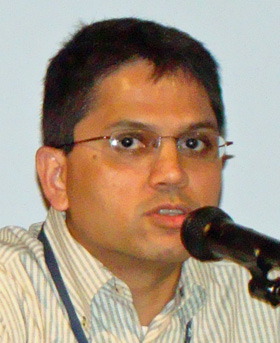
Ivor
Sequeira
Neustar (the .us registry) |
Sequeira
said .us is steadily making headway and that Neustar is seeing broad
based usage split almost 50/50 between business and
personal use. He also pointed to notable aftermarket sales including
Video.us ($75,000), Taxi.us ($25,000), Miami.us
($15,000), XBoard.us ($12,500) and a pair at $10,000
each, Brent.us and Roommates.us. In good news for .us
holders, Sequeira said the registry plans to become much more active
in promoting the extension this year.
Ironically,
foreign corporations who are attuned to ccTLDs operate the most
visible .us sites including ClubMed.us, VolvoCars.us, Hitachi.us
and BenQ.us. I also found widespread interest in the
extension among the show attendees who were all country code aficionados.
Most felt that with the continuing growth of the Internet and growing
focus on local sites that it is just a matter of time before .us
breaks out.
|
Saya
Kaigama Moustapha also appeared to speak about Cameroon's .cm registry, SARL, that
just opened a sunrise period with land rush scheduled to start July
15. .cm is drawing interest largely because it is an obvious typo of
.com, opening up the possibility of delivering error traffic on a
lot of widely searched terms. .cm will have a two-year minimum
initial registration with the fees being determined by individual
registrars.
Ryan
Steel, the President of Rick Latona's minisite development
service, AEIOU.com, spoke during the lunch break. We also
wrote extensively about their services in our March
Cover Story about the minisite service boom.
After
lunch a panel featuring Rick Silver (President, N49
Interactive), Gregg McNair (Strata PPX Services) and Laurent
Mullender (Sedo Product Development Manager) tackled the task of how best to develop and monetize
large network's of ccTLD domains.
Silver,
who is based in Toronto, Canada, is developing a huge
network on a spectacular collection of prime generic .ca
domains including Kitchens.ca, Hardware.ca, Stores.ca and dozens of
others.
Silver
said key components in his formula for large scale
development include user generated content and mashups (for
example combining lists in CraigsList with Google
maps). He also sees ccTLDs as the perfect vehicle because,
being implictly local in nature, they target people looking
for goods and services from providers near them. He said his
business revolved around a single principle, Connecting
People With Businesses.
Gregg
McNair, whose company (Strata PPX Services) is
currently building a CPA (cost per acquisition) based
monetization empire, stressed the need for domain owners who
rely on parking to reduce their dependency on Google
and
|
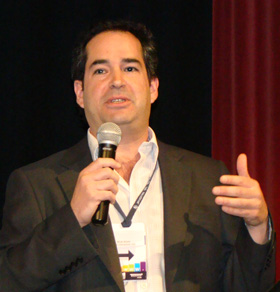
Rick
Silver
(President, N49 Interactive) |
| Yahoo.
McNair said that by using CPA and owning the entire supply
chain beginning with product manufacturers, Strata PPX has
been able to double revenue on a significant portion of
traffic from the average portfolio. |
|
|
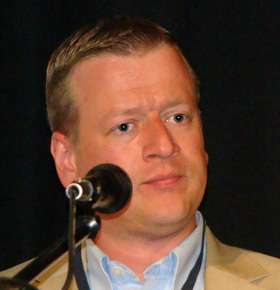
Laurent
Mullender (Sedo.com) |
For
those still reluctant to move beyond parking, Sedo's Laurent
Mullender had some good news, saying that he was seeing CPC
(cost per lick) rates rising again after a steady decline - in
fact he said CPC at Sedo was back to where it was a year
ago. Mullender agreed that development offers the highest
earnings potential but that is offset by its much higher
degree of complexity compared to parking. He said that in
2009 it is best to use a mix of strategies to stay
profitable, including buying while prices are down, parking
and also selling domains.
The final seminar
session Wednesday was both informative and entertaining, as
is usually the case when you put attorneys John Berryhill
and Paul Keating on the dais with moderator (and
fellow domain attorney) Howard Neu. They have a way
of taking what would be |
| otherwise
dry subject matter (in this case Legal Issues surrounding
the ownership, development and sale of ccTLDs) and making it
easily digestible by applying liberal doses of humor to the
discussion. |
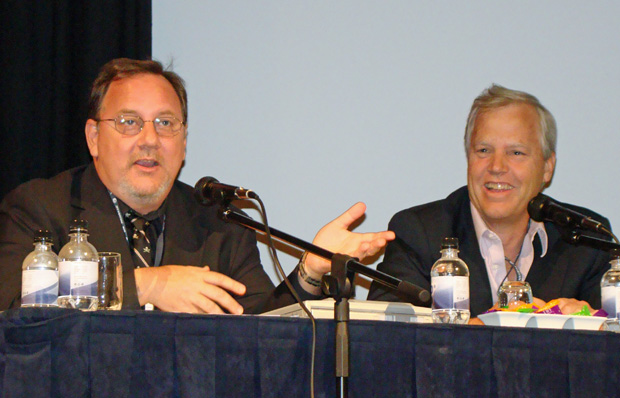
Attorneys
John Berryhill (left) and Paul Keating
They
pointed out dispute resolution procedures vary dramatically from one
country to another and domain owners are at a disadvantage in most
systems. Keating said that Great Britain's .co.uk is the only
one that has really gotten it right in terms of fairness to all
sides.
In
talking about the difference in trademark rules from one country to
another, Berryhill dispelled a common misperception that in the U.S.
Patent Office's frequently used trademark
search system is a database of trademarks. In fact, no
such database exists, Berryhill said, because no common law
trademarks (which carry significant weight in the U.S.) are listed.
This is a major difference between America and other countries where
the common law concept (earning rights to a name through usage)
carries little weight and trademarks almost always have to be
registered with the state to be valid.
The
attorneys also made a point of advising the audience that if they
are challenged for a ccTLD name that is clearly infringing they
should simply give it up rather than wasting money fighting it and
likely losing and creating a record of infringement. They said a
simple one page release letter and transfer of the domain to the complainant's
account will usually settle the issue before an adverse ruling is
made. Whatever you do, they said to never default when your
ownership of a name is challenged as this harms you and everyone
else in the community (and that default will follow you in the
future).
The
day's final business session was a keynote address delivered
by Dr. Kevin Ham
via a two-way Internet video hookup that connected Ham in
his Vancouver, Canada office with the T.R.A.F.F.I.C.
ccTLDs audience in Amsterdam. At the start, Dr. Ham
commented on this marvel of technology that allowed the two
sides to connect instantaneously across 4,800 miles, through
a line that ran under the ocean and into a 200-year-old
hotel!
Ham
also marveled at the growth he has seen since he started
acquiring domains en masse soon after the 2000 .com bust.
When he began only 5 million .com domains were
registered compared to 80 million today. Ham said he
sees similar growth opportunities in ccTLDs, particularly China's
rapidly growing .cn which he said offered a
"unique opportunity". He added that "there
will be a lot more innovation from people outside of the
mature markets like the U.S. and the UK."
|
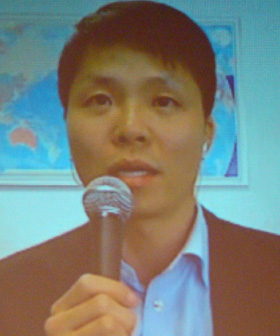
Dr.
Kevin Ham delivering his keynote
speech via a transoceanic video link. |
|
|
Dr. Ham
said that he loved the name of his company (Reinvent Technology)
because it is necessary for us to continually reinvent ourselves.
"By doing so, there is growth at an individual level as well as
among people and throughout society. Each if us has the ability and
the potential to profoundly impact the lives of people around us and
those of future generations to come."
In the
question and answer session that followed, Dr. Ham was asked what
people should be investing in now. He said, "the thing that
would get me excited would be the growth of the Internet. I would
look for a specific niche - something you see that others may not.
What could you do that would be tough for someone else to duplicate?
The great thing is that it doesn't take a lot of money to innovate
on the Internet."
|
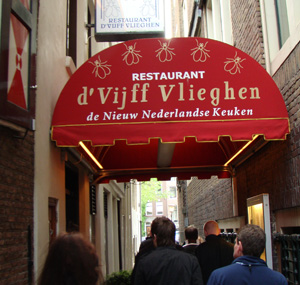
Entering
the d'Vijff Vlieghen Restaurant
Wednesday night (June 3) |
The
Wednesday night social event was again something very
special - a fabulous
dinner at Amsterdam's famous Restaurant d'Vijff Vlieghen ("The
Five Flies" in English). The restaurant has nine
dining rooms, each with its own distinctive style recreating
the rich atmosphere of the 17th century Golden Age in
Amsterdam.
The dining rooms
in turn are spread across five historic buildings. Attendees
were randomly assigned to the various dining rooms so
there was an opportunity to spend the evening making new
friends as well as enjoying a truly memorable night out in
Amsterdam. Our group included Canada's Rick Silver
and his wife Debbie who were celebrating their 20th
wedding anniversary in Amsterdam. |
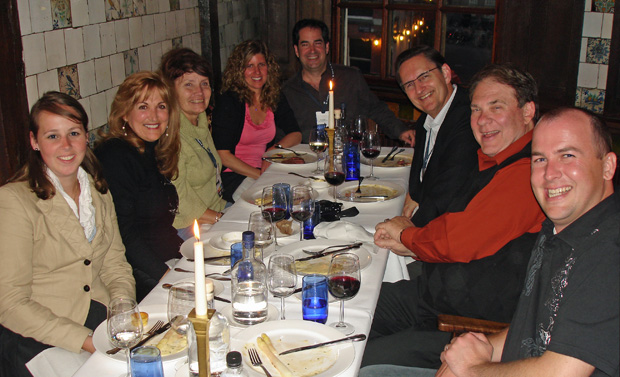
Photo
of our table at the d'Vijff Vlieghen Restaurant. Sitting 4th
and 5th from the left are
Debbie & Rick Silver who celebrated their 20th
Anniversary during the conference.
|





